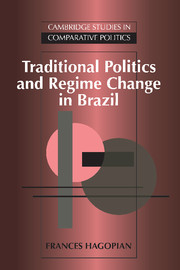Book contents
- Frontmatter
- Contents
- List of tables and figures
- Preface
- Glossary of abbreviations and Portuguese terms
- 1 Introduction: Traditional politics, new authoritarianism
- 2 Oligarchical power and traditional politics in Minas Gerais
- 3 The modern political economy of traditional politics
- 4 Bureaucratic authoritarianism and the state elite
- 5 Back to patronage: State clientelism in Minas Gerais
- 6 Authoritarian politics and traditional elites
- 7 The traditional political elite and the transition to democracy
- 8 Continuity in change: Brazilian authoritarianism and democratization in comparative perspective
- Appendix: The Minas elite
- References
- Index
7 - The traditional political elite and the transition to democracy
Published online by Cambridge University Press: 06 January 2010
- Frontmatter
- Contents
- List of tables and figures
- Preface
- Glossary of abbreviations and Portuguese terms
- 1 Introduction: Traditional politics, new authoritarianism
- 2 Oligarchical power and traditional politics in Minas Gerais
- 3 The modern political economy of traditional politics
- 4 Bureaucratic authoritarianism and the state elite
- 5 Back to patronage: State clientelism in Minas Gerais
- 6 Authoritarian politics and traditional elites
- 7 The traditional political elite and the transition to democracy
- 8 Continuity in change: Brazilian authoritarianism and democratization in comparative perspective
- Appendix: The Minas elite
- References
- Index
Summary
The forward-looking, modern military regime that revived its rule by substituting politics for the technical rationality it had once prized came to a surprisingly abrupt close in 1985 when a civilian opposition candidate, Tancredo Neves, was elected president in an electoral college convened by the military. Only months earlier, Neves's victory would have seemed impossible. Although it had become clear as a result of the watershed election of 1974 that military rule could not be institutionalized, a form of authoritarian rule easily endured, and the possibilities for a permanent “democradura” were alive and well. For a decade, political liberalization, the gradual restoration of civil liberties, and party reform had proceeded according to military plan, and the military was confident of handing power to a loyal civilian.
The deviation from military course began in 1982 with the first direct election of governors since 1965. In these elections the PMDB won nine governorships (of a possible twenty-two) and legislative majorities in the most developed states including Sāo Paulo, Rio de Janeiro, Paraná, and Minas Gerais. The PDS failed to achieve an outright majority in the federal Chamber of Deputies, and the government was forced to enter into a coalition with the Brazilian Labor Party (PTB) of Ivete Vargas. Amid economic crisis, it soon became apparent that the military government could no longer be sure of the electoral majorities it had manipulated in the 1970s, and that the authoritarian regime could no longer be sustained at the polls. From that time, it became clearer that the military would have to abdicate power, and the military struggled to maintain control over the liberalization process.
- Type
- Chapter
- Information
- Traditional Politics and Regime Change in Brazil , pp. 211 - 252Publisher: Cambridge University PressPrint publication year: 1996



